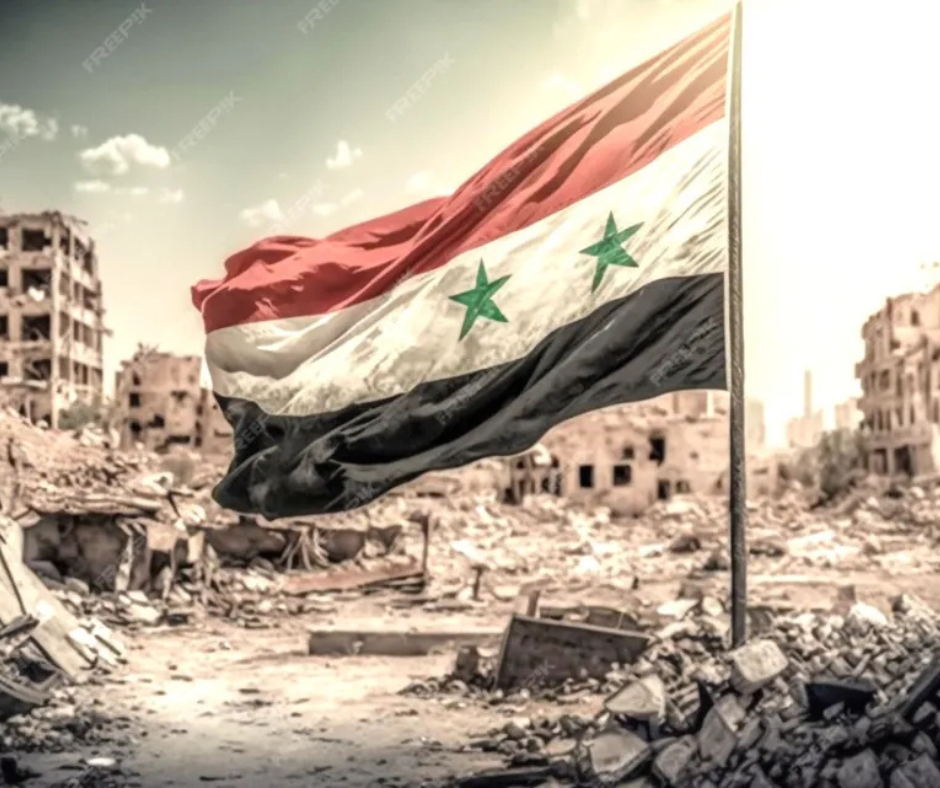Written by Mike Burnard (Analytical Strategist at dia-LOGOS)
On Monday, 15 September 2025, Syria will hold its first election since the fall of Assad. And while the headlines the past few months were dominated by bombings, betrayals, and broken promises—there’s a quieter story unfolding beneath the rubble.
In Homs, a small group of Christians gathered in the ruins of St. Mary’s Cathedral. No pews. No roof. Just scorched stone and a single wooden cross. They sang. They prayed. And they planted olive saplings in the courtyard—symbols of peace in a land thirsty for it.
One woman, Miriam, whose husband was killed in the war, said: “We do not sing because we are safe. We sing because we are still here.”
And indeed, the elections, as frail as it might be, could be the resurrection the church in Syria has been praying for. Not the sanitized kind we package for Easter, but the gritty, defiant kind that dares to say: “You will not erase us.”
THE ELECTIONS
Here’s a simple breakdown of how the Syrian parliamentary elections (15–20 September 2025) will work:
NO DIRECT VOTING
- Ordinary citizens won’t vote directly like in most democracies.
- Instead, local committees—made up of respected community leaders and experts—will choose most of the members of parliament.
TWO WAYS TO FILL SEATS
- Syria’s parliament, called the People’s Assembly, has 210 seats.
- 140 seats will be filled by electoral colleges in different districts. These are groups of people chosen to vote on behalf of their communities.
- The remaining 70 seats will be appointed directly by the president, Ahmed al-Sharaa.
WHY THIS SYSTEM?
- Syria is still recovering from years of war. Many people are displaced, and there’s no reliable voter registry.
- The government says this indirect method is temporary—meant to keep things stable while rebuilding the country.
WHAT’S NEW?
- This is the first election since the fall of Bashar al-Assad’s regime in 2024.
- The old system was tightly controlled, with little real choice. This new setup is meant to be more inclusive, though it’s still limited.
WHO’S WATCHING?
- A special Higher Committee for Elections is overseeing the process.
- International observers may be involved, but details are still emerging.
In short: no public voting booths, but local representatives will choose most of the parliament, and the president picks the rest. It’s a cautious step toward rebuilding Syria’s political system after 14 years of war
FROM A CHRISTIAN PERSPECTIVE
The elections are stirring both cautious hope and deep concern among Syria’s Christian communities. For Syria’s Christians the parliamentary elections are more than a political event—they’re a spiritual crossroads, a test of endurance, and a fragile flicker of hope in a land where the Church has stood for two millennia.
A COMMUNITY UNDER PRESSURE
Christian communities—Greek Orthodox, Melkite Catholics, Armenians, and Protestants—have been deeply affected by the collapse of the Assad regime and the rise of a transitional government led by President Ahmed al-Sharaa. While the new leadership has promised religious tolerance, Christians face a chaotic and unstable reality. Attacks on churches, desecration of symbols, and targeted violence have increased since late 2024. The bombing of Mar Elias Church in Damascus in June, which killed over two dozen worshippers, was a chilling reminder of their vulnerability.
ELECTIONS WITHOUT A VOICE?
The election system itself—indirect voting through district-based electoral colleges and presidential appointments—means Christians won’t vote directly. This has left many feeling excluded from shaping the future, especially in regions where they once played key roles in education, medicine, and public life.
Some Christian leaders worry that the new system may entrench Islamist influence, especially with groups like Hayat Tahrir al-Sham involved in the transitional coalition. Even symbolic shifts—like replacing “good morning” with “peace be upon you” in government offices—have stirred unease about creeping religious conformity.
FAITHFUL PRESENCE, NOT POLITICAL POWER
Yet amid the fear, many Christians are choosing a different posture—not one of withdrawal, but of prophetic presence. Churches continue to offer sanctuary, trauma healing, and liturgical witness. In Bab Sharqi, Damascus’s historic Christian quarter, believers hung neon “Merry Christmas” signs and carried crosses through the streets, demanding recognition and dignity.
This election, then, is not just about parliamentary seats. It’s about whether Syria will honor the spiritual and cultural legacy of its Christian communities—those who trace their roots to Paul’s conversion on the road to Damascus, and to the ancient city of Antioch where followers of Jesus were first called Christians.
A THEOLOGY OF RESILIENCE
From a theological lens, this moment calls for lament and hope. Christians are asking: Can resurrection emerge from ruins? Can hospitality overcome exclusion? Can the Church remain a voice for justice, even when silenced politically?
The elections may not offer direct representation, but they do offer a chance to reclaim moral imagination. To insist that peace is not the absence of conflict, but the presence of dignity. And to remind Syria—and the world—that the Church, though bruised, is not broken.
In this fragile moment, the Church’s role may be less about power and more about presence: a quiet but resilient sign of hope in a land aching for renewal.
A PRAYER FOR THE ELECTIONS
(Taken from Copilot)
God of mercy,
You who walked the dusty roads of Damascus and wept over broken cities,
Draw near to Syria in this hour of decision.
We lift before You a nation scarred by war,
A people weary from exile, silence, and shattered trust.
Let Your Spirit hover over ballot boxes and council chambers,
Over refugee camps and ruined churches,
Over hearts that dare to hope again.
Where fear seeks to rule, plant courage.
Where manipulation threatens, raise up truth-tellers.
Where voices are excluded, amplify the cry of the poor, the displaced, the faithful remnant.
We pray for Christian communities—
For those who remain, and those scattered across the earth.
May their witness be not in power, but in presence.
Not in dominance, but in dignity.
Let their liturgies echo with lament and longing,
And their lives proclaim resurrection in the ruins.
Guide those who lead, O Lord.
Let justice roll down like waters,
And righteousness like an ever-flowing stream.
May this election not be a performance,
But a step toward reconciliation, inclusion, and peace.
And if the road ahead remains uncertain,
Teach us to walk it with faith,
To speak with grace,
To act with courage,
And to love with Your fierce, redeeming love.
Amen.

